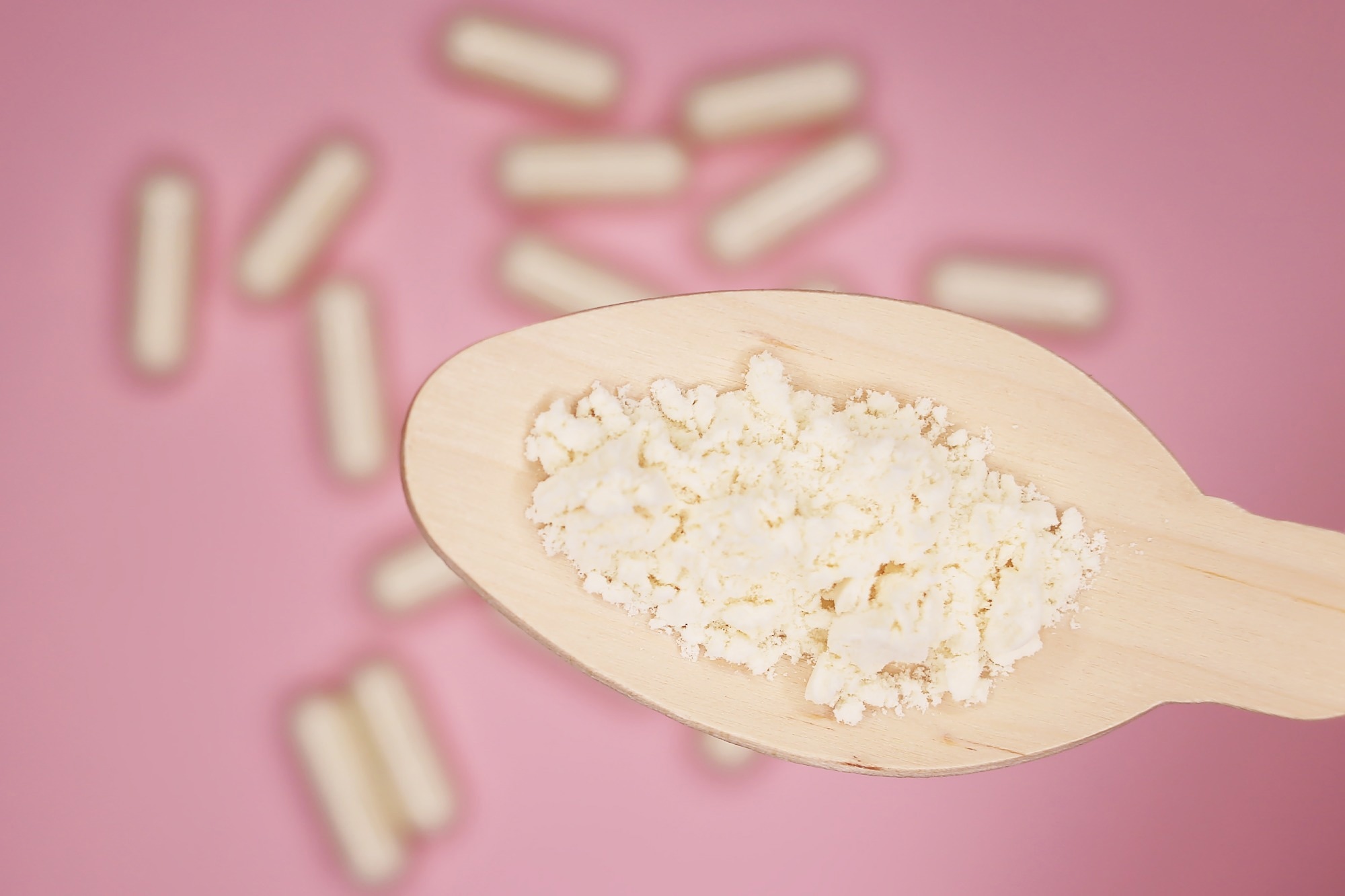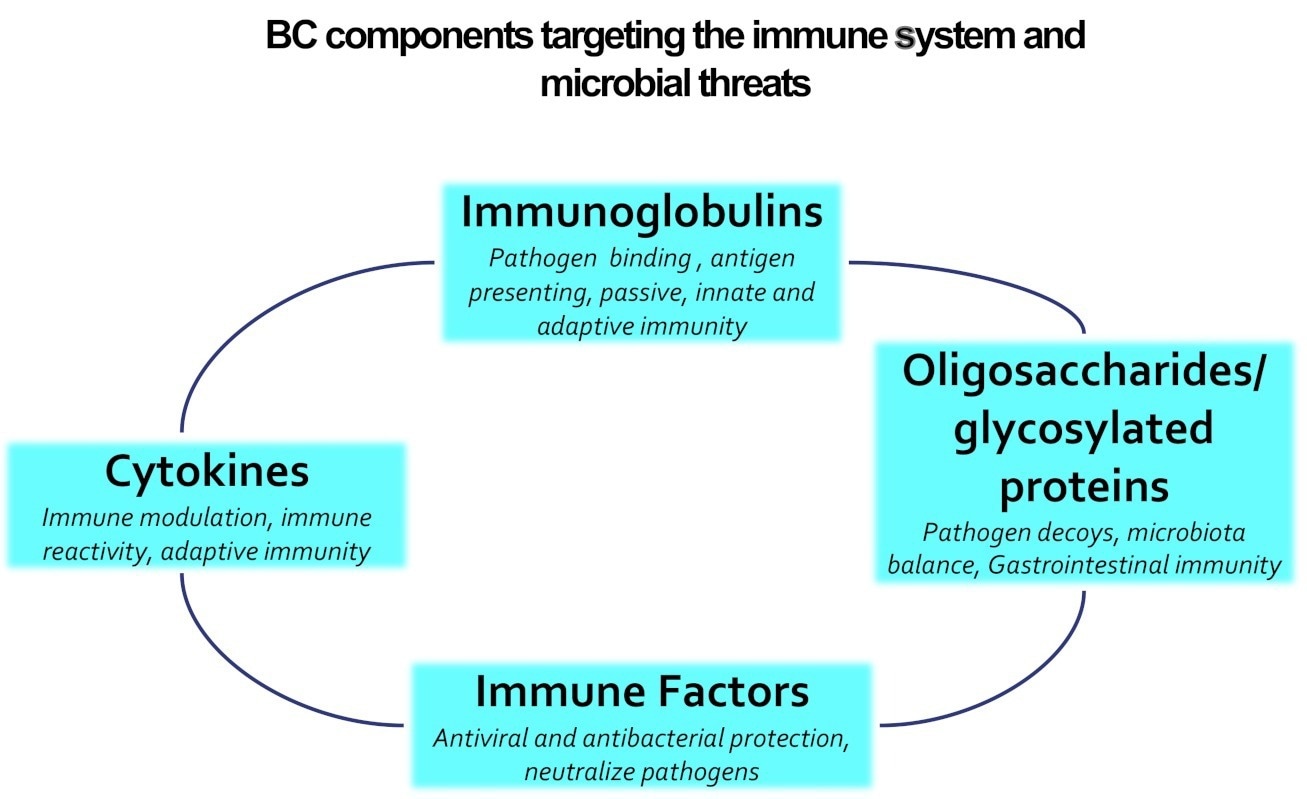Introduction
Composition of Colostrum
Immunity-Boosting Effects
Gut Health and Barrier Function
Tissue Repair and Recovery
Emerging Applications
Safety, Limitations, and Challenges
Conclusions
Related video
References
Further reading
Colostrum contains bioactive compounds that support adult immunity, gut integrity, and tissue repair. Early clinical trials show promising results, but larger studies are needed to confirm its safety and effectiveness.

Colostrum powder. Image Credit: kristiillustra / Shutterstock
Introduction
Colostrum is the first nutrient-rich fluid produced after childbirth, compositionally distinct from mature milk. Rich in proteins, fats, glycans, vitamins, minerals, and immune factors (immunoglobulins (Ig), lactoferrin, lactoperoxidase) plus oligosaccharides, it supports newborn development and gut integrity.1,3
While human colostrum is essential for infants, bovine colostrum has long been used as a nutritional supplement and is now the subject of growing research for adult health.
Emerging evidence in adults suggests improved gastrointestinal barrier function, support for exercise recovery and lean mass, and immune modulation in elderly and immunocompromised populations, as well as mitigation of non-steroidal anti-inflammatory drug (NSAID)-related gut injury.1,3
These findings are stimulating interest in safe, standardized preparations of colostrum for adults in foods and supplements.1,3
This article reviews colostrum for adults, highlighting its benefits for immunity, gut barrier health, and tissue repair, as well as safety considerations and research gaps.1,3
Composition of Colostrum
Colostrum is a highly concentrated matrix of nutrients and bioactive compounds. Bovine colostrum on day one contains ~14–16% protein with abundant casein and whey peptides, together with fat- and water-soluble vitamins, especially riboflavin, cobalamin, vitamin D, and tocopherol, and higher levels of key minerals such as calcium, zinc, magnesium, and phosphorus than mature milk.2
Bovine colostrum also concentrates immune factors, including immunoglobulin G (IgG) at 34–87 g/L, immunoglobulin A (IgA) at 3.2–6.2 g/L, and lactoferrin at 1.5–5 g/L. In addition, it carries cytokines (e.g., tumor necrosis factor-α, interleukin-1β, interleukin-6, interleukin-10) that shape innate and adaptive responses and can dampen excess nuclear factor kappa-light-chain-enhancer of activated B cells (NF-κB) signaling.2
Growth factors such as insulin-like growth factors (IGF-I/II) and epidermal growth factor (EGF) are present and may act synergistically with lactoferrin.2
For adults, this composition plausibly supports mucosal immunity, antimicrobial defense, and epithelial repair, helping to maintain gut barrier integrity, moderate inflammation, and aid recovery under stressors such as NSAID exposure or strenuous exercise.2

Multiple constituents of BC are involved in modulating the immune system and targeting microbes and other threats.
Immunity-Boosting Effects
Colostrum enhances both innate and adaptive immunity through a dense matrix of immunoactive molecules. It delivers IgG, IgA, and immunoglobulin M (IgM), which neutralize antigens and engage the complement system, while cytokines such as EGF, transforming growth factor-β (TGF-β), and IGF support epithelial integrity and regulate lymphocyte proliferation and tolerance.1,3
Colostrum also contains antimicrobial enzymes, such as lactoferrin, lactoperoxidase, and lysozyme, that contribute to nonspecific defense. Beyond these, colostrum modulates immune balance: in models, it expands T-regulatory cells (Tregs) and shifts the balance of T-helper lymphocyte type 1 (Th1)/Th2 cytokines, indicating coordinated effects on adaptive responses.1,3
Antimicrobial and antiviral activity is supported by laboratory and translational evidence. Colostrum fortifies the antibacterial capacity of human milk, and preparations containing anti-rotavirus antibodies prevented rotavirus gastroenteritis in infants and mice; notably, purified Igs alone did not fully reproduce protection, implicating additional colostral factors.1,3
Clinically, bovine colostrum helps prevent upper respiratory tract infections (URTI) and shortens illness burden. In children with recurrent URTI, bovine colostrum reduced episodes, diarrheal attacks, and hospitalizations over two to six months; in preschoolers, a six-week course lessened URTI frequency and severity with benefits lasting ~20 weeks.1,3
In adolescents, six weeks of bovine colostrum increased salivary immunoglobulin A (sIgA), a key mucosal antibody, consistent with improved airway defenses. Recent reviews also suggest immune-supportive effects in older adults and immunocompromised groups.3
Gut Health and Barrier Function
Bovine colostrum helps maintain intestinal integrity by tightening epithelial junctions and tempering inflammation. In randomized and controlled studies of active adults, bovine colostrum reduced exercise-induced permeability on dual-sugar tests and lowered plasma intestinal fatty acid-binding protein, signals of less enterocyte injury.4
Bovine colostrum has also been shown to decrease stool zonulin and circulating bacterial deoxyribonucleic acid (DNA) (Bacteroides 16S), indicating reduced microbial translocation (“leaky gut”). Mechanistically, bovine colostrum’s Igs, lactoferrin, growth factors (e.g., IGF-1), and cytokines (including TGF-β) act synergistically to strengthen the mucosa, modulate gut-associated immunity, and neutralize endotoxins, collectively damping oxidative and inflammatory stress within the gut barrier.4
Bovine colostrum may also influence the microbiota: reductions in Bacteroides and favorable shifts reported with bovine colostrum-containing regimens align with improved barrier and immune tone. Clinically, these barrier-restoring and anti-endotoxin effects are relevant to disorders marked by permeability and inflammation.4
Small trials have shown lower endotoxemia in surgical patients given colostrum preparations, and histologic improvement when colostrum enemas were added to therapy for distal colitis, supporting further evaluation in inflammatory bowel disease (IBD). For irritable bowel syndrome (IBS), where low-grade inflammation and epithelial leak can occur, bovine colostrum’s barrier and immune actions are biologically plausible, but targeted, well-controlled trials in IBS/IBD populations are needed to define optimal dosing, formulations, and durability of benefit.4
Tissue Repair and Recovery
IGF-1 is a central driver of skeletal-muscle repair. By activating the Phosphoinositide 3-kinase (PI3K) / Protein Kinase B (PKB) / Mechanistic Target of Rapamycin (mTOR) signaling cascade, IGF-1 stimulates protein synthesis, suppresses atrophy genes (e.g., atrogin-1 via forkhead box O (FoxO)), and expands/activates satellite cells.
After damage, the mechano-growth-factor isoform (IGF-IEc) appears early to trigger satellite-cell activation, while IGF-IEa sustains protein accretion, together accelerating regeneration. TGF-β is often elevated in aging and injury and can block myogenic differentiation; modulation of this pathway (or provision of exogenous IGF-I/II that rescues differentiation despite TGF-β) restores a pro-regenerative milieu.5
In sports medicine, IGF-1 is correlated with aerobic fitness and muscular endurance. In preclinical models, it increases muscle mass and strength, limits degeneration, and protects against contraction-induced injury. Controlled-release or polyethylene glycol (PEG)- ylated IGF-1 improves functional recovery after ischemia–reperfusion injury, highlighting its potential to shorten downtime, enhance training adaptation, and support performance; however, human trials have been constrained by delivery and safety considerations.5
For wound healing and postsurgical recovery, local, sustained IGF-1 delivery hastens regeneration by tempering inflammatory cytokines and preserving muscle, including in sepsis and ischemic models; targeting motor neurons helps maintain neuromuscular junction integrity in aged muscle. Combinations that pair IGF-1 with angiogenic support (e.g., vascular endothelial growth factor (VEGF)) further restore perfusion and myogenesis.
Clinical translation favors targeted, local dosing to maximize benefit and minimize systemic risks.5
Emerging Applications
Early clinical and mechanistic data suggest that bovine colostrum may support metabolic health by dampening systemic inflammation and reshaping metabolism. In orthopedic patients, 21-day supplementation with bovine colostrum lowered C-reactive protein and interleukin-6 over 90 days, accompanied by parallel improvements in pain, mood, and sleep, indicating a reduction in inflammatory burden.
This trial (IRCT20220424054643N1) demonstrated that colostrum supplementation improved mental health status and alleviated pain after an acetabular fracture.6 In older adults, 12-week colostrum intake altered pro-inflammatory mediator expression and untargeted metabolomic profiles, consistent with beneficial metabolic shifts.1
The neuroprotective potential is supported by gut–brain axis pathways, where lactoferrin and other bioactives strengthen intestinal barrier function, steer dysbiosis toward eubiosis, and increase the production of short-chain fatty acids. These short-chain fatty acids can modulate neuroinflammation, bolster blood–brain barrier integrity, and influence neurotransmission.
These converging effects are now being tested beyond post-fracture recovery; longitudinal research in both athletes and clinical populations continues to expand potential applications. Overall, colostrum is emerging as a safe adjunct across inflammatory and metabolic conditions worldwide.6
Safety, Limitations, and Challenges
Overall, bovine colostrum appears to be well-tolerated in adults in short-term trials, with a favorable safety profile; however, the mechanisms and inter-individual responses remain unclear. Caution is required in individuals with lactose intolerance or milk protein allergies, and product selection for vulnerable groups (e.g., preterm infants) must exclude Bacillus cereus contamination.3
Supplement quality and bioactive content vary widely, as their composition shifts with factors such as breed, parity, disease, timing of first milking, season, and other on-farm variables, making standardization challenging. Processing introduces variability; separating and preserving fractions is challenging, which affects product consistency.1,2
Many retail products are low-dose tablets or capsules that deliver less than clinical study doses, raising questions about dose equivalence. Evidence remains limited, as findings are based on small pilots (e.g., seven volunteers for NSAID-induced permeability; 14 patients with ulcerative colitis), rather than large multicenter trials. Heterogeneous protocols and endpoints contribute to inconsistent results in studies. Randomized trials are needed to define efficacy, dosing, and populations (e.g., gastrointestinal disorders), as well as to determine whether whole colostrum or specific fractions offer the best risk-benefit ratio.4
Conclusions
Colostrum emerges as a promising, food-derived adjunct for adult health, coupling immune defense with mucosal and tissue support. Rich in Igs, lactoferrin, cytokines, and growth factors, it can bolster innate and adaptive responses, reinforce gut barrier integrity, and promote repair after stressors such as strenuous exercise, medication injury, or surgery.
Early trials and mechanistic studies suggest reductions in permeability, inflammatory markers, and illness burden, alongside signals of improved recovery. However, heterogeneous products, variable dosing, and small, short studies limit certainty. Rigorous, standardized randomized trials are required to define efficacy, indications, optimal formulations, and safety, and to guide evidence-based clinical use.
What Is Colostrum ? – Dr.Berg on Benefits of Colostrum
References
- Arslan, A., et al. (2021). Bovine colostrum and its potential for human health and nutrition. Frontiers in Nutrition, 8. DOI: 10.3389/fnut.2021.651721.
https://www.frontiersin.org/journals/nutrition/articles/10.3389/fnut.2021.651721/full
- Playford, R. J., & Weiser, M. J. (2021). Bovine colostrum: Its constituents and uses. Nutrients, 13(1). DOI: 10.3390/nu13010265.
https://www.mdpi.com/2072-6643/13/1/265
- Duan, H., et al. (2024). A review: the effect of bovine colostrum on immunity in people of all ages. Nutrients, 16(13). DOI: 10.3390/nu16132007.
https://www.mdpi.com/2072-6643/16/13/2007
- Dziewiecka, H., et al. (2022). A Systematic Review of the Influence of Bovine Colostrum Supplementation on Leaky Gut Syndrome in Athletes. Nutrients, 14(12). DOI: 10.3390/nu14122512.
https://www.mdpi.com/2072-6643/14/12/2512
- Song, Y. H., et al. (2013). The therapeutic potential of IGF-I in skeletal muscle repair. Trends in Endocrinology & Metabolism, 24(6), 310–319. DOI: 10.1016/j.tem.2013.03.004.
https://www.cell.com/trends/endocrinology-metabolism/abstract/S1043-2760(13)00051-9
- Gouhari, F., et al. (2024). Colostrum supplementation enhances mental health status and alleviates pain in patients with acetabular fracture. Journal of Functional Foods, 119. DOI: 10.1016/j.jff.2024.106325.
https://www.sciencedirect.com/science/article/pii/S175646462400327X
Further Reading
Last Updated: Sep 11, 2025